管理学原理英文版课件Chapter 2 The Management Environment
合集下载
管理学英语ppt课件ppt课件
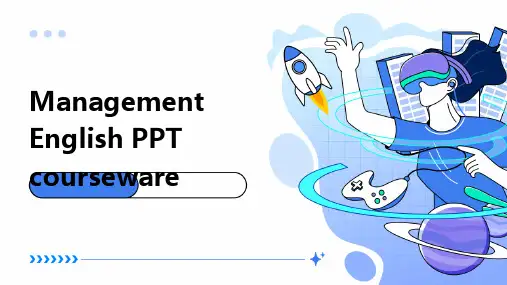
Risk control
Analyze potential risks, develop response measures, and ensure organizational safety.
Feedback and improvement
Collect feedback information, continuously improve management methods and processes.
Managerial Skills
Strategic vision
With a broad vision and the ability to plan for the long term.
Decision making ability
Scientifically analyze problems and make decisive decisions.
Communication and coordination skills
Good at communication and able to coordinate the interests of all parties.
Leadership
Unleash team potential and lead the team to grow together.
Establish an effective information communication mechanism to ensure the accuracy and timeliness of information transmission.
Leading
Motivation and Communication
管理学(英文版全套课件)
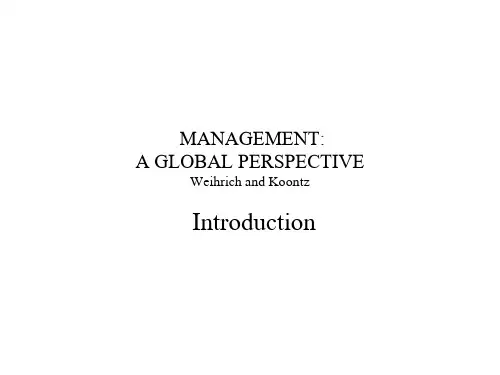
• Malcolm Baldrige National Quality Award established by the U.S. Congress in 1987 • ISO 9000, pioneered by the Europeans • European Quality Award given by the European Foundation
Arguments Against Social Involvement
• • • • • • • Violation of profit maximization Dilution of purpose Costs Too much power Lack of skills Lack of accountability Lack of universal support
• France
– Le Plan and the Cadre
• Germany
– Authority and Codetermination
• Korea
– Chaebol and Inhwa
Japanese Management
• Lifetime Employment • Seniority System • Decision Making in Japan
Chapter 2. Management and Society: The External Environment, Social Responsibility, and Ethics
The Organization and Its External Environment
Arguments for Social Involvement
Definition of Whistle-Blowing
Arguments Against Social Involvement
• • • • • • • Violation of profit maximization Dilution of purpose Costs Too much power Lack of skills Lack of accountability Lack of universal support
• France
– Le Plan and the Cadre
• Germany
– Authority and Codetermination
• Korea
– Chaebol and Inhwa
Japanese Management
• Lifetime Employment • Seniority System • Decision Making in Japan
Chapter 2. Management and Society: The External Environment, Social Responsibility, and Ethics
The Organization and Its External Environment
Arguments for Social Involvement
Definition of Whistle-Blowing
管理学原理英文版课件Chapter 2 The Management Environment
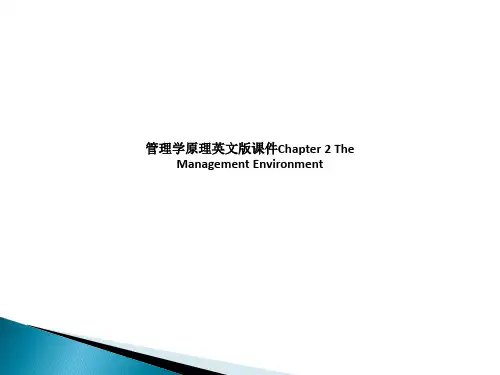
◦ Serve customers better, enhance production, provide better information, etc.
E-Organizations
• E-commerce (sales side of electronic business): any computer transaction that occurs when data are processed and transmitted over the internet
Entrepreneurship – the process of starting a business venture, organizing the necessary resources, and assuming the risks and rewards
Important Themes:
Public Expectations
Arguments for and against social responsibility by businesses must be
considered by manaibility = a firm’s obligation, beyond what is required by the law and economics, to pursue long-term goals that benefit society
advantages ◦ Starting the venture ◦ Managing the venture
Managing the Workforce
Downsizing – create more efficient operations through extensive layoffs
E-Organizations
• E-commerce (sales side of electronic business): any computer transaction that occurs when data are processed and transmitted over the internet
Entrepreneurship – the process of starting a business venture, organizing the necessary resources, and assuming the risks and rewards
Important Themes:
Public Expectations
Arguments for and against social responsibility by businesses must be
considered by manaibility = a firm’s obligation, beyond what is required by the law and economics, to pursue long-term goals that benefit society
advantages ◦ Starting the venture ◦ Managing the venture
Managing the Workforce
Downsizing – create more efficient operations through extensive layoffs
2管理学(双语)课件
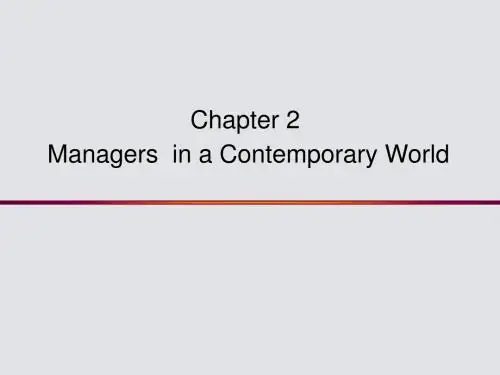
2
Learning Outcomes (cont’d) ’
6. Summarize the essential roles performed by managers. 7. Discuss whether the manager’s job is generic. 8. Describe the four general skills necessary for becoming a successful manager. 9. Describe the value of studying management. 10. Identify the relevance of popular humanities and social science courses to management practices.
– A management structure in which internal arrangements that impose artificial geographic barriers are broken down
Global Competition
• Multinational corporations (MNCs)
A Global Marketplace
• Global village
– The concept of a boundaryless world; the production and marketing of goods and services worldwide.
• Borderless organization
• Strategic alliances
– A domestic firm and a foreign firm share the cost of developing products or building production facilities in a foreign country.
Learning Outcomes (cont’d) ’
6. Summarize the essential roles performed by managers. 7. Discuss whether the manager’s job is generic. 8. Describe the four general skills necessary for becoming a successful manager. 9. Describe the value of studying management. 10. Identify the relevance of popular humanities and social science courses to management practices.
– A management structure in which internal arrangements that impose artificial geographic barriers are broken down
Global Competition
• Multinational corporations (MNCs)
A Global Marketplace
• Global village
– The concept of a boundaryless world; the production and marketing of goods and services worldwide.
• Borderless organization
• Strategic alliances
– A domestic firm and a foreign firm share the cost of developing products or building production facilities in a foreign country.
《管理学》(Management)(英文大纲).ppt
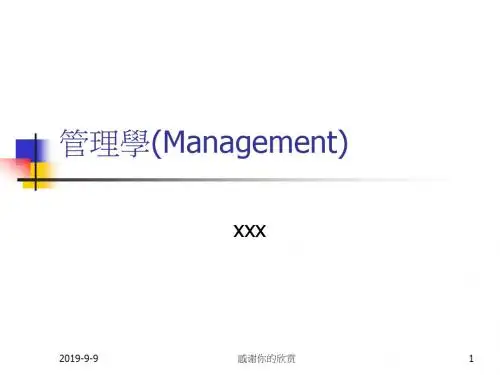
2019-9-9
感谢你的欣赏
11
Part 4 Organizing
Chapter 10 Organizational Structure and Design
Defining organizational structure Organizational design decisions Common organizational designs
The decision-making process The pervasiveness of decision making The manager as decision maker
2019-9-9
感谢你的欣赏
8
Part 3 Planning(Cont’d)
Chapter 7 Foundations of Planning
2019-9-9
感谢你的欣赏
16
Part 5 Leading(Cont’d)
Chapter 15 Understanding Groups and Teams
Understanding group behavior Turning group into effective teams Developing and managing effective teams
2019-9-9
感谢你的欣赏
21
Part 6 Controlling(Cont’d)
Chapter 20 Controlling for Organizational Performance
Organizational performance Tools for monitoring and measuring
管理学(斯蒂芬 罗宾斯 第九版)英文课件(第二章)
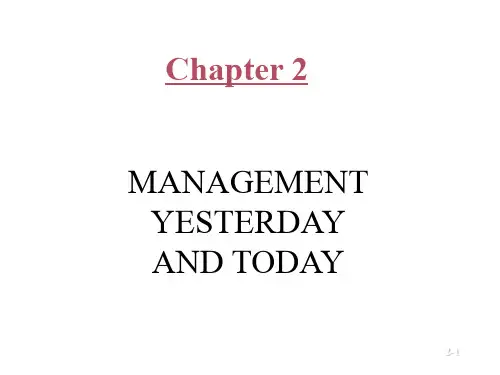
– Wealth of Nations - Adam Smith • division of labor - breakdown of jobs into narrow and repetitive tasks increased productivity
– Industrial Revolution • substitution of machine power for human power • large organizations required formal management
– Describe the contributions of the general administrative theorists一般行政管理
– Summarize the quantitative approach定量方法 to management
– Describe the contributions of the early organizational behavior组织行为 advocates
© Prentice Hall, 2002
2-13
EARLY ADVOCATES OF OB
© Prentice Hall, 2002ehavior (cont.)
Hawthorne Studies
– started in 1924 at Western Electric Company
– use of scientific methods to define the “one best way” for a job to be done
– perspective of improving the productivity and efficiency of manual workers
– Industrial Revolution • substitution of machine power for human power • large organizations required formal management
– Describe the contributions of the general administrative theorists一般行政管理
– Summarize the quantitative approach定量方法 to management
– Describe the contributions of the early organizational behavior组织行为 advocates
© Prentice Hall, 2002
2-13
EARLY ADVOCATES OF OB
© Prentice Hall, 2002ehavior (cont.)
Hawthorne Studies
– started in 1924 at Western Electric Company
– use of scientific methods to define the “one best way” for a job to be done
– perspective of improving the productivity and efficiency of manual workers
chapter 01 Managers and Managing 《管理学》(双语)课程课件
– Taking action to increase performance as required. – The outcome of control is the ability to measure
performance accurately and regulate efficiency and effectiveness.
anizing
Structuring working relationships in a way that allows organizational members to work together to achieve organizational goals.
Organizational Structure
Three steps in the planning process – Deciding which goals to pursue – Deciding what courses of action to adopt – Deciding how to allocate resources
14
16
4. Controlling
Evaluating how well an organization is achieving its goals and taking action to maintain or improve performance.
– Monitoring individuals, departments, and the organization to determine if desired performance standards have been reached.
Challenges for Management in a Global Environment
performance accurately and regulate efficiency and effectiveness.
anizing
Structuring working relationships in a way that allows organizational members to work together to achieve organizational goals.
Organizational Structure
Three steps in the planning process – Deciding which goals to pursue – Deciding what courses of action to adopt – Deciding how to allocate resources
14
16
4. Controlling
Evaluating how well an organization is achieving its goals and taking action to maintain or improve performance.
– Monitoring individuals, departments, and the organization to determine if desired performance standards have been reached.
Challenges for Management in a Global Environment
chapter 02 The Evolution of Management Theory 《管理学》(双语)课程课件(48学时)
– Realized that job specialization resulted in much higher efficiency and productivity
Breaking down the total job allowed for the division of labor in which workers became very skilled at their specific tasks.
16
2. Fayol’s Principles of Management
Line of Authority
– A clear chain of command from top to bottom of the firm.
Centralization
– The degree to which authority rests at the top of the organization.
9
4. Four Principles of Scientific Management
Principles to increase efficiency:
- Study the ways jobs are performed now and determine new ways to do them.
10
5. Problems with Scientific Management
5.1 Managers frequently implemented only the increased output side of Taylor’s plan.
– Workers did not share in the increased output.
Breaking down the total job allowed for the division of labor in which workers became very skilled at their specific tasks.
16
2. Fayol’s Principles of Management
Line of Authority
– A clear chain of command from top to bottom of the firm.
Centralization
– The degree to which authority rests at the top of the organization.
9
4. Four Principles of Scientific Management
Principles to increase efficiency:
- Study the ways jobs are performed now and determine new ways to do them.
10
5. Problems with Scientific Management
5.1 Managers frequently implemented only the increased output side of Taylor’s plan.
– Workers did not share in the increased output.
管理学原理第二章
•
Current
•
Issues and Trends
Explain why we need to look at the current trends and issues facing managers. Describe the current trends and issues facing managers.
Advocated the division of labor (job specialization) to increase the productivity of workers a hospital surgery team; restaurant kitchens
Industrial Revolution Substituted machine power for human labor Created large organizations in need of management
Scientific Management
Fredrick Winslow Taylor Putting the right person on the job with the correct tools and equipment. Having a standardized method of doing the job. Providing an economic incentive to the worker. Frank and Lillian Gilbreth Focused on increasing worker productivity through the reduction of wasted motion Developed the micro chronometer to time worker motions and optimize work performance The meaning of Science management Production is highly labor-intensive, builders ‗ major cost are brick and worker
全英文版管理学精品课件Chapter_02
ห้องสมุดไป่ตู้ 3
Chapter Objectives
Hua ZHU
3/19/2013
After studying this chapter, you should be able to: Describe the nature of the pluralistic society and selected environments Explain the social responsibility of managers and the arguments for and against the social involvement of business Understand the nature and importance of ethics in managing and ways to institutionalize ethics and raise ethical standards Recognize that some ethical standards vary in different societies Realize that trust is the basis for human interaction
▫ substantial expense entailed to meet regulations ▫ limit choices available to organizations
Political conditions - general stability of country
▫ attitudes of governmental officials toward business
6
Hua ZHU 3/19/2013
- 1、下载文档前请自行甄别文档内容的完整性,平台不提供额外的编辑、内容补充、找答案等附加服务。
- 2、"仅部分预览"的文档,不可在线预览部分如存在完整性等问题,可反馈申请退款(可完整预览的文档不适用该条件!)。
- 3、如文档侵犯您的权益,请联系客服反馈,我们会尽快为您处理(人工客服工作时间:9:00-18:30)。
Public Expectations
Arguments for and against social responsibility by businesses must be
◦ Serve customers better, enhance production, provide better information, etc.
E-Organizations
• E-commerce (sales side of electronic business): any computer transaction that occurs when data are processed and transmitted over the internet
The business world has fewer political boundaries, so managers must adapt to cultures, systems, and techniques that are different from their own
International Business
Globalization
• A boundaryless world comes with new challenges
– Managing in a country with a different national culture
– Biggest issue: perception of “foreigners”
• Transnational corporation (TNC) – company that maintains operations in more than one
country at the same time and decentralizes decision making about operations to the local country
• Parochialism – narrow focus to see things only through one’s own view; their business practice is the best
5 Dimensions of National Culture
Power distance Individualism versus collectivism Quantity of life versus quality of life Uncertainty avoidance Long-term versus short-term orientation
• Multinational corporation (MNC) – company that maintains significant operations in two or more countries at the same time but are
based in one home country
The affect of technology
In the past, all work was performed at the work site so it was easy for the manager to supervise and communicate with the workers
– Online shopping
• E-business: all activities included in a successful internet-based enterprise
• E-organization: applying e-business concepts to all organizations
Using technology
Technology = any equipment, tools or operating methods that are designed to make work more efficient
Integrate technology into a process for changing inputs into outputs
Today, telecommuting makes it possible for
employees to be located anywhere in the world Telecommuting = a system of working at home on a computer that is linked to the office
◦ Agriculture (until 1890s) ◦ Industrialization (1890-1960s) ◦ Information (1970s-present way of doing things
A global marketplace
GLOBE Dimensions
Nine dimensions on which national cultures are different:
◦ Assertiveness ◦ Future orientation ◦ Gender differentiation ◦ Uncertainty avoidance ◦ Power distance ◦ Individualism/collectivism ◦ In-group collectivism ◦ Performance orientation ◦ Humane orientation
管理学原理英文版课件Chapter 2 The Management Environment
Chapter 2
The Management Environment
Evolution of Modern Civilization
Modern civilization evolved over three “waves”:
